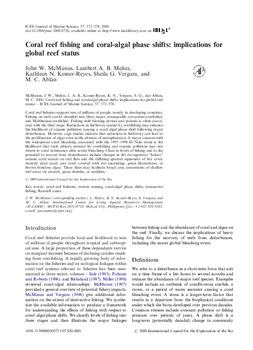Coral reef fishing and coral-algal phase shifts: implications for global reef status

Citation
McManus, J.W. et al. (2000). Coral reef fishing and coral-algal phase shifts: implications for global reef status. ICES Journal of Marine Science 57: 572-578
Coral reef fisheries support tens of millions of people, mostly in developing countries. Fishing on reefs can be classified into three stages: manageable, ecosystem-overfished, and Malthusian-overfished. Fishing with blasting devices and poisons is often associated with the third stage. Reductions in herbivory caused by overfishing may enhance the likelihood of organic pollution causing a coral–algal phase shift following major disturbances. However, cage studies indicate that reduction in herbivory can lead to the proliferation of algae even in the absence of eutrophication. A major concern with the widespread coral bleaching associated with the 1997–1998 El Niño event is the likelihood that reefs already stressed by overfishing and organic pollution may not return to coral dominance after severe bleaching. Clues to levels of fishing and to the potential to recover from disturbances include changes in the de-vegetated "haloes" around coral stands on reef flats and the differing spectral signatures of live coral, recently dead coral, and coral covered with red encrusting, green filamentous, or brown frondose algae. These clues may facilitate broad area assessments of shallow reef areas via aircraft, space shuttles, or satellites.
Permalink
Date Available
Type
Publisher
ISSN
1054-3139
Research Themes
Topics
Language